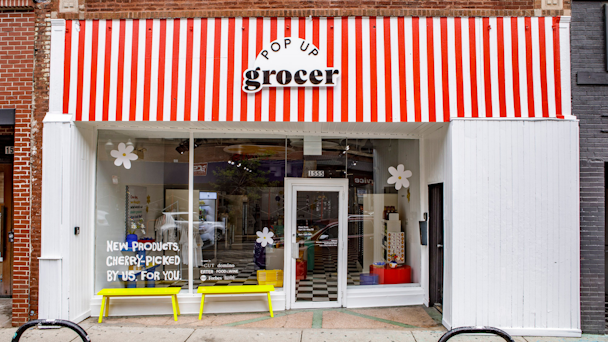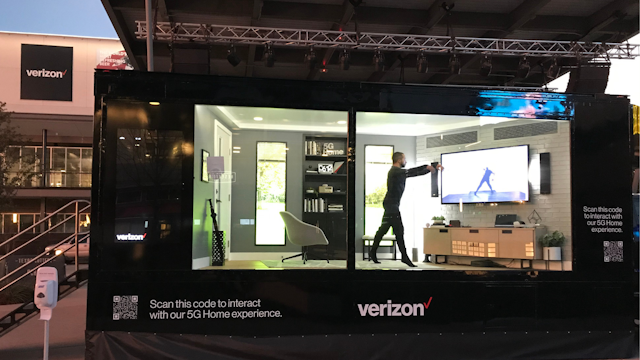Is this the summer of the pop-up store?
With white-washed retail stores up for grabs, warmer weather and consumers itching to spend, this could be the perfect equation for a flurry of pop-up stores. Here’s why these activations might explode in a good way – or bad.

Pop-up retailers may be all the rage this summer
If you happen down Milwaukee Avenue near Chicago’s Wicker Park, in your favorite mask (or not), you may notice a new addition: Pop Up Grocer. This temporary storefront showcases a bevy of good-for-you products that were, not so long ago, predominantly only available in the digital direct-to-consumer variety. Items include Behave low-sugar gummy bears and OffLimits cereal.
Pop-up retail could be poised to explode as the vaccine rolls out, the summer is nigh, and shuttered storefronts pockmark cities. Especially since 12,200 stores closed in 2020, according to CoStar Group, a commercial real-estate information and analytics advisor.
Lululemon is utilizing empty storefronts, such as one in Escondido, California, not only to sell overstocks and seasonal merchandise but also to alleviate the long lines at established outlets caused by pandemic occupancy guidelines.
The Canadian fashion retailer Aritzia opened a pop-up shop, Super World, blocks from its New York flagship. The brand also opened a pop-up in the Melrose Avenue space once belonging to the famed fashion retailer Fred Segal. The retailer announced it would update concepts periodically.
“Eighty-four percent of US consumers right now say they cannot wait to spend more money on fun, exciting things that will get them out of the house,” says Lisa Gramling, senior vice-president, research innovation and intelligence at experiential advertising agency Momentum Worldwide, part of McCann Worldgroup.
Verizon and LG take it to the streets
Much of the pop-up energy has also moved to the streets. Experiential events are starting to see a revival, with brands staging mobile events and parking-lot installations.
Verizon just took the brakes off a mobile truck tour where consumers can prompt performers inside a glass enclosure to play a video game or stream a program to showcase 5G speeds, which is having a moment with consumers dealing with overtaxed bandwidth. Momentum created the activation.
LG washers and dryers are on a seven-market truck tour, devised by Lupine Creative, where teams are washing consumer’s unwanted clothing to then donate to Big Brothers Big Sisters of America and LGBT+ centers to draw attention to fast-fashion textile waste.
Walmart is currently staging interactive events in its Mother’s May Market. This builds on the pop-up feeling in store parking lots that Walmart has successfully leveraged throughout the pandemic in conjunction with Momentum.
“Guess what, dad, your kids aren’t going to bring home the popsicle stick frames, so this gives dads an opportunity to bring their kids to a socially-distant experience where they can make a craft,” says Momentum’s Gramling.
The more creative the activation the better, as consumers are looking to be entertained. For example, in February Lupine took over a Burbank car wash and turned it into a 1970s showpiece to promote HBO’s show The Lady and the Dale. Consumers drove through the car wash, the ultimate in social distancing. “Lines were around the block, continuously,” said Lupine’s founder and chief executive Kate Wolff. “People are dying to get out and see the world again.”

Sticking a pin in the pop-up
Despite the momentum behind these experiential activations, there are some factors that may take the air out of pop-ups.
Pop Up Grocer founder and chief executive Emily Schildt has been able to run her business, which hops from city to city for one-month stints, through the pandemic as food stores remained an essential business. Still, Schildt reports that landlords in many markets across the US are hesitant to drop rates for short-term leaseholders as they anticipate a long-term lease renaissance come summer.
And then there are fears of virus variants and another unwelcome spike in positive cases. “What we are experiencing in our agency is a lot of wait and see,” says Jim Cusson, president at Theory House, a creative agency specializing in retail innovation. “The early movers are the ones who might break through because they will have less competition.”
The Pop Up Shop Agency creative director Hope Newman notes that some brands are taking a hybrid approach, where their activations combine street-level activations with influencer campaigns, so if Covid-19 mandates should halt consumer activities they can pivot to social media.
“Say we do a pop-up installation in Santa Monica where we go out for the day and have a bunch of cute models playing with our beach balls,” says Newman. “What if something happened, and California governor Gavin Newsome says no one is going out this week? At the same time, we have already planned a virtual tie-in, sending beach balls to influencers who will play with them [and post].”
No matter what the scenario, this promises to be a summer like no other for marketers. Pop Up Grocer’s Schildt, who has followed customary sanitation and social-distancing guidelines throughout the pandemic, is hopeful the momentum will build from lockdown when “basically, there was nothing to do on calendars anymore and people were very grateful to have a safe event to attend.”
